|
|
|
Sort Order |
|
|
|
Items / Page
|
|
|
|
|
|
|
| Srl | Item |
| 1 |
ID:
124387
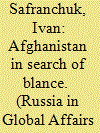

|
|
|
|
|
| Publication |
2012.
|
| Summary/Abstract |
Afghanistan will reach a benchmark in 2014. By the end of that year, the International Security Assistance Force (ISAF), a NATO-based coalition led by the U.S. since 2001, will withdraw from the country. Presidential elections will be held in Afghanistan in the second half of 2014.
|
|
|
|
|
|
|
|
|
|
|
|
|
|
|
|
| 2 |
ID:
124379
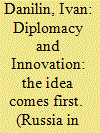

|
|
|
|
|
| Publication |
2012.
|
| Summary/Abstract |
central idea in recent debates in Russia is that innovation is a sign of economic revival and that innovation will help the country achieve a respectful place in the world economy and politics. Indeed, without innovation, Russia would remain a hybrid, a country with tremendous ambitions and questionable opportunities. Economic scenarios for an innovative Russia abound, but no one has come up with any substantial proposals about what kind of foreign policy Russia needs in this context. Foreign policy has been outside the framework of innovation policy and vice versa, except for a mention of the non-proliferation regime and arms control. Yet these merely imply putting a cap on "bad" technologies rather than supporting "good" ones. At times it has been suggested that Russian science be used as "soft power" (Irina Dezhina addresses this issue), but this is still a matter of debate rather than diplomatic practice. Is this division correct? What role can Russia's foreign policy play in the country's innovative development? What should be done to realize the innovative potential of foreign policy?
|
|
|
|
|
|
|
|
|
|
|
|
|
|
|
|
| 3 |
ID:
127050


|
|
|
|
|
| Publication |
2013.
|
| Summary/Abstract |
Central and Eastern European (CEE) countries are undergoing a transition from one socio-economic system to another. Individuals, communities and societies are in a state of continuous transformation necessitated by the globalization of markets and changes in basic traditional behavioral modes, primarily economic ones. The changes necessitated by systemic transition, on the one hand, and those determined by the logic of globalization (for CEE countries the process also means regional unification as they integrate into the European market), on the other, will hardly be agreeable and smooth.
In most CEE countries, the state still remains not only a most influential economic actor but, in fact, also the dominant and, in some cases, hegemonic one. The share of the gross domestic product redistributed through budgets of all levels is still high. Governments have large property and actively pursue their economic interests by establishing new laws.
|
|
|
|
|
|
|
|
|
|
|
|
|
|
|
|
| 4 |
ID:
124331


|
|
|
|
|
| Publication |
2012.
|
| Summary/Abstract |
The current developments in the world can best be described by the word 'uncertainty.' And it is not just the rate at which the events occur or their abundance, although by these parameters the change has no precedent. The international environment is undergoing a qualitative change that calls into question not only practical approaches but even the very methods of analysis. Yevgeny Gontmakher and Nikita Zagladin say the paradigm set by the Age of Enlightenment has been exhausted due to the non-uniformity and non-linearity of the globalization's effects.
|
|
|
|
|
|
|
|
|
|
|
|
|
|
|
|
| 5 |
ID:
127011
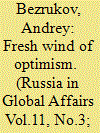

|
|
|
|
|
| Publication |
2013.
|
| Summary/Abstract |
The international system is currently in the midst of a profound crisis. Each cycle of "creative destruction" of the old world order changes "the rules of the game." The new international system will be shaped by new factors of success and new behaviors of its actors. The faster a country adapts to the new rules, the more successful it will be in the coming 10 to 20 years. The speed of the adaptation to the new global environment will greatly depend on the capacity of governments to understand where the world is going and to build a sound competitive strategy.
The Atlantic Council, in its recent report "Envisioning 2030: U.S. Strategy for a Post-Western Word," based on the scenarios published by the National Intelligence Council, believes that the United Stated has a second chance to win the dominant position in the world. Remarkably, Russia gets almost no mention in the report, it is virtually written off as an influential player of the future.
Does Russia have a chance in the new global system? What are its challenges? What should Russia do to succeed? We believe that the success of Russia will depend on its ability to rethink its place in the world and devise a new strategy that would differ from the one it used in era of the Euro-Atlantic great-power rivalry.
|
|
|
|
|
|
|
|
|
|
|
|
|
|
|
|
| 6 |
ID:
124352
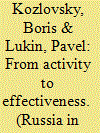

|
|
|
|
|
| Publication |
2012.
|
| Summary/Abstract |
Some four years ago, an author wrote in this journal that the conflict with Georgia would be a watershed that would put an end to Moscow's post-Soviet approach to the world. He believed Russia would finally formulate "a program of realistic and pragmatic foreign policy matching its genuine strategic interests and the goals of economic and social development" (Alexander Lukin, "From a Post-Soviet to a Russian Foreign Policy."
|
|
|
|
|
|
|
|
|
|
|
|
|
|
|
|
| 7 |
ID:
127052
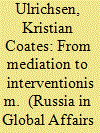

|
|
|
|
|
| Publication |
2013.
|
| Summary/Abstract |
During the first two years of the Arab Spring, Qatar's regional posture went into "overdrive," initially in Libya and subsequently in Syria. The country took advantage of the unique niche which it had spent years crafting in order to play an astoundingly high-profile and increasingly controversial role in the uprisings. Initially, it displayed unprecedented regional leadership bordering on outright activism in responding to crises across the Arab world. This greater self-confidence reflected multiple factors, including (relative) domestic stability and a progressive form of governance, as well as the ability to take and execute decisions quickly and the aforementioned experience in mediation. As a result, at the onset of the Arab Spring protests across the Middle East and North Africa, Qatar boasted a distinctive combination of characteristics rare in the Arab world, including regionally and internationally recognized legitimacy, a relatively progressive stance towards governance, an ability to make swift policy decisions, and extensive experience in mediation. All of these factors positioned Qatar to assume an extraordinarily visible and interventionist role during the Arab Spring upheaval.
|
|
|
|
|
|
|
|
|
|
|
|
|
|
|
|
| 8 |
ID:
124390


|
|
|
|
|
| Publication |
2012.
|
| Summary/Abstract |
Long consigned to the background of the international arena, Central Asia has been a testing ground for such sensational concepts as "a clash of civilizations," a "Big Game," etc. I believe such ideas have become morally and historically obsolete.
|
|
|
|
|
|
|
|
|
|
|
|
|
|
|
|
| 9 |
ID:
127014


|
|
|
|
|
| Publication |
2013.
|
| Summary/Abstract |
Diplomats are grappling today with a host of problems in a globalized world: countries are becoming increasingly linked; national boundaries have grown more porous; and borders between internal and external processes are disappearing. The foreign affairs of any country do not stand by themselves anymore, diplomats can no longer be guided exclusively by large-scale geopolitical plans or constructs. The development of any one country and the logic of how its central government is built hinges on the surrounding situation in the same way that the global situation depends on the decisions taken by large - and not so large - countries. And, of course, foreign policy professionals cannot be indifferent to events happening within their countries and to whether these events befit the international context or stand at odds with it.
|
|
|
|
|
|
|
|
|
|
|
|
|
|
|
|
| 10 |
ID:
127008
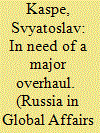

|
|
|
|
|
| Publication |
2013.
|
| Summary/Abstract |
Twenty years after it was established, Russia's post-Soviet political system is still experiencing problems. The system is subject to such disorder and dysfunction that even the most loyal government official cannot help but notice. Russia's political system does not ensure that the objectives for which it was designed can be accomplished. The system's capacity to accumulate resources of various types (material, ideological, and human) and to distribute them is weak and continues to deteriorate, while the system's expenses are exorbitant. Moreover, it is becoming increasingly difficult to control the political system. Public trust in the government and other political structures is very low and the relatively high ratings of individual politicians cannot make up for it. The very same ratings, which in essence form the only bastion of the regime, face the risk of a sudden collapse.
We have almost forgotten that politics should have a value component (the fascination with perestroika proved to be short-lived). The absence of value guidelines beyond accounts of benefits and costs turns politics into a nasty parody of itself and deprives it of power and functionality.
|
|
|
|
|
|
|
|
|
|
|
|
|
|
|
|
| 11 |
ID:
127034
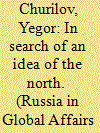

|
|
|
|
|
| Publication |
2013.
|
| Summary/Abstract |
The Republic of Belarus emerged as a sovereign political entity on the world political map more than twenty years ago. The breakup of the Soviet Union made it possible for the constituent republics to acquire an independent status, and for the COMECON and Warsaw Pact countries, shrug off Soviet protectorate. In contrast to most of these states, Belarus has built its own economic and political model and retained a truly independent political stance, even though it has found itself sandwiched between geopolitical giants in the West and in the East. Belarus as a state in its own right is an established fact of history that has to be taken into account by its European neighbors and overseas strategists who seek to use its special place and role to their own advantage.
|
|
|
|
|
|
|
|
|
|
|
|
|
|
|
|
| 12 |
ID:
127051
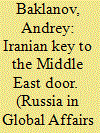

|
|
|
|
|
| Publication |
2013.
|
| Summary/Abstract |
The election of Hassan Rouhani as Iran's president attracted everyone's attention with the inaugural ceremony attended by officials from more than 50 countries. The event gave rise to numerous propositions about a possible progress in the regime and in Tehran's future relations with the rest of the world. The prevailing perception is that the victory of a moderate and pragmatic candidate gives hope for a more fruitful dialogue which may facilitate the solution of numerous persisting problems. There is a good deal of reasoning in the propositions, yet deep-seated stereotype thinking still prevails. The assessments definitely need serious correction if we do not want to miss the opening opportunities - once again. In a situation of rigid Western economic sanctions and complicated relations with practically all of its neighbors, Iran nevertheless is turning into a most important state in a vast geopolitical area that embraces the Middle and Near East, Central and Western Asia. The Iranian aspect is present in practically all international problems that draw global attention, such as nuclear nonproliferation, the Middle East peace process, the legal status of the Caspian Sea, Central Asia, etc. Tehran is an active participant in the dialogue of civilizations and, naturally, remains one of the key players on the hydrocarbon market. To a large extent, Iran's role has been enhanced by the difficulties brought about by the Arab Spring in other major countries in the region, including Egypt - Iran's traditional competitor - which is sinking into the quagmire of internal political confrontation. Prior to the presidential election I happened to visit Iran and talk with some leading politicians and clerics about the situation in the country, their perception of the Iranian nuclear program and other issues that link Iran with other countries in the region and major world powers. Given the role played by the religious factor, it was particularly interesting to hear the opinions of religious leaders when visiting the holy Shi'ite city of Qom.
|
|
|
|
|
|
|
|
|
|
|
|
|
|
|
|
| 13 |
ID:
127047
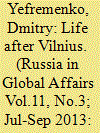

|
|
|
|
|
| Publication |
2013.
|
| Summary/Abstract |
This article presents some of the results of a project conducted as part of a Russian Academy of Sciences program: "Perspectives of Coordinated Social and Economic Development of Russia and Ukraine in the Pan-European Context."
A political anniversary passed largely unnoticed on 12 September 2013: fifty years ago on that date Turkey and the European Economic Community signed an association agreement. Although it might be a good time to look back on what has been achieved since then and make plans for the future, Turkish politicians have largely ignored the anniversary. And for good reason! While the association agreement resulted in tangible economic benefits for Turkey, in the political sense it doomed that ambitious country to 50 years of humiliating uncertainty in the antechamber of a unifying Europe. Today Ukraine, another large country, is impatiently waiting to be let into that antechamber. But no political analyst in his right mind will state that Ukraine will not have to wait longer than Turkey for full-fledged European Union membership.
|
|
|
|
|
|
|
|
|
|
|
|
|
|
|
|
| 14 |
ID:
127025
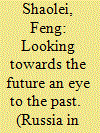

|
|
|
|
|
| Publication |
2013.
|
| Summary/Abstract |
With the world's political and economic focus gradually shifting to the Asia-Pacific region, bilateral relations between China and Russia are facing new challenges and opportunities. For both China and Russia, the current changes may have a more profound impact on and significance for readjusting their development strategies than any changes that took place in previous decades.
|
|
|
|
|
|
|
|
|
|
|
|
|
|
|
|
| 15 |
ID:
127037
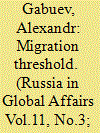

|
|
|
|
|
| Publication |
2013.
|
| Summary/Abstract |
Russia's policy in Central Asia has been determined by the logic of interaction between great powers and international prestige for two decades after the breakup of the USSR. But illegal migration, or, rather, the public sentiment around it, is becoming such a significant factor in the domestic political situation that it can make Moscow revise its priorities in relations with Central Asian countries. Changes might impact even the Eurasian Economic Union project.
|
|
|
|
|
|
|
|
|
|
|
|
|
|
|
|
| 16 |
ID:
124385
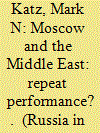

|
|
|
|
|
| Publication |
2012.
|
| Summary/Abstract |
When Vladimir Putin first came to power over a decade ago, he launched a foreign policy initiative to improve Russia's relations with and influence in the countries of the Middle East, which had languished during the Yeltsin era. By 2010, this initiative had succeeded dramatically. With the active involvement of Putin himself both through visiting several Middle Eastern countries as well as receiving their leaders in Moscow, Russia had established good working relations with all the major actors in the Middle East: anti-American Muslim governments (Iran and Syria) as well as pro-American ones (such as Saudi Arabia, Egypt, and Qatar) and even American-installed ones (Iraq and Afghanistan); Israel as well as Fatah and even Hamas and Hezbollah. Indeed, Russia had good relations with every government and most major opposition movements, with the notable exception of Al Qaeda (which did not want good relations with anyone except for movements similar to itself).
|
|
|
|
|
|
|
|
|
|
|
|
|
|
|
|
| 17 |
ID:
127026
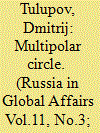

|
|
|
|
|
| Publication |
2013.
|
| Summary/Abstract |
International cooperation in the Arctic has been expanding steadily since the start of the 21st century, assuming systemic outlines over a relatively short period of time (from 2006 till 2013), as evidenced by a series of development concepts approved by the interested countries for their respective regions. The review of these documents indicates that most of the key tasks lie in the foreign policy field, with Arctic diplomacy playing a major role in their implementation. Unique geographical and climatic features make the Arctic truly international. The Arctic Ocean is a center of gravity for polar and off-polar nations. Dividing lines here are less noticeable than on land, but this does not detract from their legal significance. More often than not, resources within the exclusive economic zones of the five littoral states are transboundary in nature and their development (e.g., Shtokman field, Yamal LNG) requires the creation of international consortiums. Apart from cooperation, the Arctic states also have to coordinate their mutual interests and regulate disputes. All these aspects in their entirety form the thematic area within which Arctic diplomacy is used
|
|
|
|
|
|
|
|
|
|
|
|
|
|
|
|
| 18 |
ID:
124332
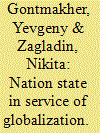

|
|
|
|
|
| Publication |
2012.
|
| Summary/Abstract |
The outlook for the world's development has become ever less predictable over the past decades. In the 1980s, practically no one foresaw the collapse of the Soviet system of unions, and then of the USSR itself. True, in retrospect one may easily point to the symptoms that had indicated this sort of outcome was very likely, but it is well-known that it is far easier to explain retroactively accomplished events than to identify their probability in good time.
|
|
|
|
|
|
|
|
|
|
|
|
|
|
|
|
| 19 |
ID:
124357


|
|
|
|
|
| Publication |
2012.
|
| Summary/Abstract |
One of the major problems facing both analysts and ideologues of nationalism is the paradoxical use of the term. On the one hand, nationalism is an odious and marginal phenomenon, not to mention a synonym for social deviation. A passage from Vladimir Putin's campaign platform "The 2012-2018 Program" provides a vivid example of this: "We will fight any attempts to use information space for the propaganda of cruelty, nationalism, pornography, drug abuse, smoking, and alcoholism." Many prime examples of political propaganda pale in the face of this refined logical order.
|
|
|
|
|
|
|
|
|
|
|
|
|
|
|
|
| 20 |
ID:
124340
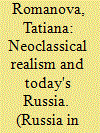

|
|
|
|
|
| Publication |
2012.
|
| Summary/Abstract |
This article is to outline a theoretical context for a relatively new discussion. Initially, I will formulate the main provisions of neoclassical realism, then I will briefly review the neoclassical view of Russian foreign policy that we presented three years ago. Finally, I will look at how the ongoing transformations - some of which are clearly visible while others are hardly noticeable - may influence the conception and practical realization of Russian foreign policy.
|
|
|
|
|
|
|
|
|
|
|
|
|
|
|
|
|
|
|
|
|